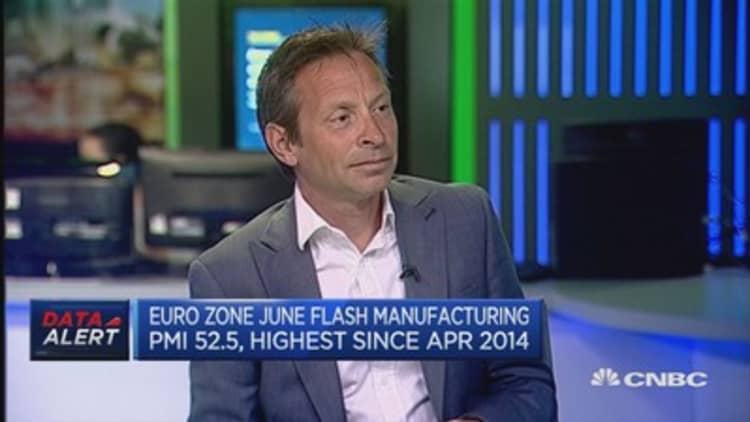
Business activity in the 19-member euro zone expanded at its fastest pace in four years in June, data on Tuesday showed, in the latest sign that a recovery in the region is finally gaining traction.
The flash Markit Composite Purchasing Managers' Index (PMI), which tracks manufacturing and service sector activity, rose to 54.1 in June from 53.6 in May.
The reading was in line with analyst expectations in a Reuters poll and held above the 50-mark that divides expansion from contraction.
PMI data released earlier on Tuesday from Europe's two big economies – Germany and France – also painted a brighter outlook for the euro zone economy.
The French PMI data showed the country's manufacturing sector expanded in June for the first time since April 2014. Germany's composite PMI meanwhile rose to 54.0 in June from 52.6 in May.
"We had a really good reading in France – it is now growing at a nice rate and there are signs that consumers are spending more," said Chris Williamson, chief economist at Markit which compiles the PMI data.
"When you look at the second quarter as a whole, it's a much more reassuring picture because you have business activity and employment growth in everywhere outside France and Germany growing at the fastest rates since mid-2007," he added.
The French PMI data was seen as particularly encouraging since growth in France, the euro zone's number two economy, has proved disappointing in recent years. Indeed, the French manufacturing PMI was above the 50 level for the first time in a year.
Read MoreEconomic data on tap but Greece take center stage
The euro zone economy, for so long a laggard in global growth, has played catch up this year thanks to the European Central Bank's 1 trillion euro ($1.12 trillion) monetary stimulus. Lower oil prices and a weaker euro have also helped boost economic growth.
The single currency has tumbled 17 percent against the U.S. dollar over the past year and is down about 7 percent so far this year, giving exporters a competitive edge abroad.
"Overall, the euro-zone PMI points to GDP (gross domestic product) growth of about 0.4 percent on the quarter in Q2, in line with Q1's outturn," James Howat, European economist at Capital Economics, said in a note.
"But to the extent that the recovery is driven by weaker oil prices and the drop in the euro, it may weaken as these tailwinds fade in the coming quarters," he said.

Data released on Tuesday showed China's flash June PMI rose to 49.6 in June but remained below the 50-mark, indicating that the activity in the manufacturing sector remains in contraction territory.
Concerns about Greece meanwhile may undermine the outlook for the euro zone economy in the months ahead, analysts said.
Latest developments suggest the cash-strapped country is nearing a deal with its creditors that would allow it to avoid a default and possible exit from the euro zone. But the road ahead is still long and the Greece crisis is far from resolved, analysts say.
Markit's Williamson said businesses are getting more worried about Greece.
Howat at Capital Economics added: "Given that Greece's membership of the euro remains precarious, a messy exit might yet damage the euro-zone recovery."


